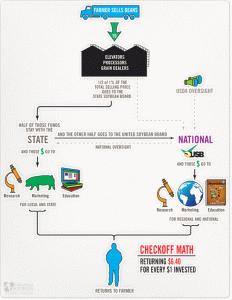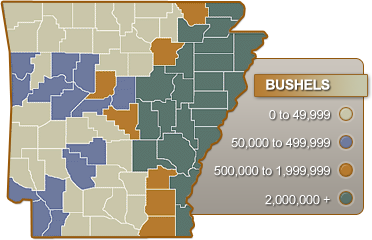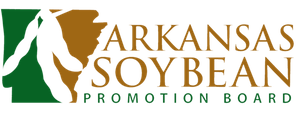Checkoff Research

When high-yielding harvests are not enough to secure success for today’s soybean producers, checkoff dollars help ensure a strong, profitable future for producers through driving demand at home and abroad.
 Administered by the United Soybean Board (USB), producers invest 0.5 percent market price per bushel, known as a checkoff, into a fund. Used for research, market development, promotion and expansion, the Arkansas Soybean Promotion Board (ASPB) manages half of all checkoff dollars collected in the state and the USB adds the rest to the national checkoff fund*.
Administered by the United Soybean Board (USB), producers invest 0.5 percent market price per bushel, known as a checkoff, into a fund. Used for research, market development, promotion and expansion, the Arkansas Soybean Promotion Board (ASPB) manages half of all checkoff dollars collected in the state and the USB adds the rest to the national checkoff fund*.
Run by 69 volunteer farmers and directors, the USB is based in St. Louis, Missouri with activities monitored by paid staff. Nominated by their state’s soybean board, or Qualified State Soybean Boards (QSSB), they are appointed by the U.S. Secretary of Agriculture. Three members of the USB’s board of directors hail from Arkansas.
Soybeans in Arkansas
 Traditionally one of the largest agriculture enterprises in the state with more than 3-million acres of soybean fields in 56 percent of the counties, Arkansas is one of the top 10 soybean producing states in the country.
Traditionally one of the largest agriculture enterprises in the state with more than 3-million acres of soybean fields in 56 percent of the counties, Arkansas is one of the top 10 soybean producing states in the country.
- Animal agriculture is the number one customer of soybean, 98 percent of soybean meal feeds livestock and poultry.
- Broiler chickens consume about 40 percent of the domestic supply of soybean meal.
- By 2020, China’s demand for U.S. soy will increase by 37 percent with increased demand for protein.
- Approximately 30 percent of soybeans are considered a double crop. Following spring’s wheat harvest, soybeans are planted, allowing the harvest of two row crops in one year.
- Optimum planting in Arkansas is between May 5 – July 5 and they will be harvested between October 15 and November 20.
- Irrigation-furrow via flood and sprinkler is common practice across more than 2-million acres of soybeans.
Learn more about the impact of soybeans on our economy.
*Since checkoff dollars are dedicated to research and promotion efforts, the American Soybean Association (ASA) advocates on state and national legislative and regulatory policy issues.
